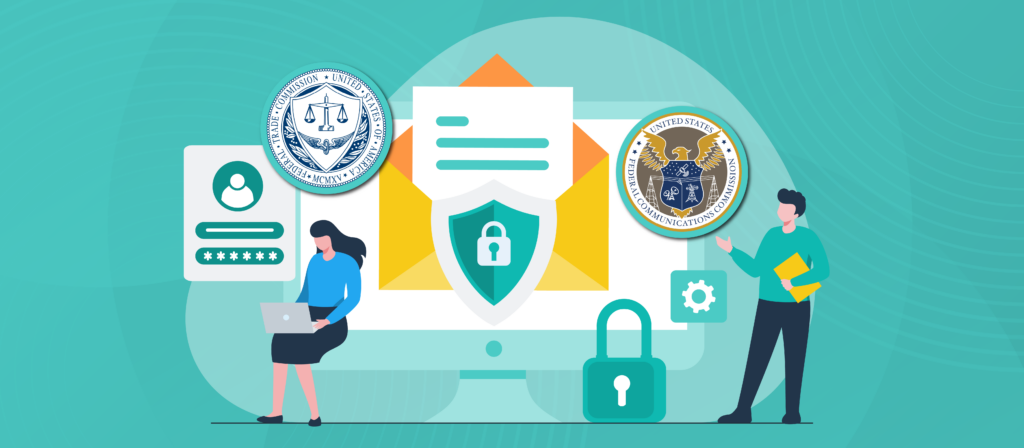Understanding FTC and FCC regulations for marketing

Digital marketing moves fast, and keeping up with the rules is key to protecting your brand and avoiding costly mistakes. Two of the most important regulatory bodies are the Federal Trade Commission (FTC) and the Federal Communications Commission (FCC).
In this guide, we’ll cover the basics of both the FTC and FCC, including their roles, the key differences between them, and the most important regulations they enforce. We’ll also give you some tips on how to stay compliant with key marketing regulations to keep your business focused on compliance.
What are the FTC and FCC?
The United States government has several regulatory bodies to ensure fair trade and business practices, two of the most important being the FTC and the FCC. Both organizations play critical roles in safeguarding the interests of consumers and businesses and ensuring compliance with federal laws. While they have distinct areas of focus, their regulatory powers often intersect in today’s digital marketing landscape.
The FTC is responsible for upholding laws that protect consumers and promote fair competition. Its mission is to prevent the use of anticompetitive, deceptive, or unfair business practices, enhance informed consumer choice and public understanding of the competitive process, and accomplish this without unduly burdening legitimate business activity.
The FTC has the authority to regulate a broad array of marketing directed industries, including advertising, retail, financial services, and healthcare products or services. As a marketer or business owner, it’s important to understand the FTC’s rules and regulations to ensure your marketing efforts are both compliant and ethical.
The FCC, on the other hand, oversees interstate and international communications. Its core duties include managing the radio spectrum, issuing licenses for radio and TV broadcasting, and enforcing regulations for telecommunications.
Though its origins lie in traditional media, the FCC now extends its reach to the internet and wireless technologies. Its expanding role in net neutrality rules and consumer telecommunications privacy is pivotal in today’s digital landscape. For businesses and marketers in broadcasting, telecommunications, or online services, understanding FCC regulations is essential.
What’s the difference between the FCC and FTC?
The FCC and the FTC are both U.S. government agencies, but they have distinct roles and responsibilities.
Federal Communications Commission (FCC)
- Focus: Communications and telecommunications industries.
- Scope: Regulates communications via radio, television, wire, satellite, and cable across the U.S.
- Key responsibilities:
- Managing broadcast licensing and spectrum allocation.
- Enforcing laws related to telecommunication (e.g., robocall regulations under the Telephone Consumer Protection Act – TCPA).
- Overseeing broadband and internet service providers.
- Protecting consumers from harmful practices in telecom and broadcasting (e.g., spam calls and texts).
- Example activities:
- Setting rules for telecommunications companies.
- Implementing anti-robocall measures.
Federal Trade Commission (FTC)
- Focus: Consumer protection and antitrust enforcement.
- Scope: Broader focus across industries, targeting unfair or deceptive business practices (UDTP).
- Key responsibilities:
- Preventing deceptive advertising and marketing.
- Enforcing antitrust laws to maintain fair competition.
- Protecting consumer privacy (e.g., ensuring companies follow data protection practices).
- Investigating and penalizing fraud, scams, and deceptive practices.
- Example activities:
- Investigating companies for false advertising claims or unfair, deceptive data privacy practices.
- Enforcing the Telemarketing Sales Rule (TSR).
Key differences
| Aspect | FCC | FTC |
| Primary focus | Telecommunications and communications | Consumer protection and antitrust |
| Authority | Industries related to communications tech | Broad authority across all industries |
| Enforcement scope | TCPA, robocalls, broadband regulations | Fraud, scams, deceptive practices |
| Overlap example | Enforces TCPA rules for robocalls | Addresses robocalls if linked to fraud |
In short, the FCC is the go-to for communication technology regulation, while the FTC focuses on general consumer protection and competitive practices. They often collaborate on issues like robocalls or online privacy, where their jurisdictions overlap.
How the FCC vs FTC consumer privacy enforcement works
When it comes to the FCC vs FTC consumer privacy enforcement, the two agencies play distinct but complementary roles.
The FCC enforces consumer privacy rules specifically tied to communications, such as the Telephone Consumer Protection Act (TCPA) and the Do Not Call (DNC) rules. Its focus is on how businesses use phone calls, texts, faxes, and robocalls, ensuring that U.S. consumers’ consent rights are respected. For example, the FCC sets and enforces rules around prior express written consent for telemarketing and has authority to fine companies that violate those rules.
The FTC, by contrast, takes a broader approach to consumer protection. It enforces privacy and data security practices across industries, including marketing, online advertising, and digital services. The FTC steps in when companies engage in unfair or deceptive practices, such as misrepresenting how consumer data will be used, failing to safeguard sensitive information, or ignoring promises in their privacy policies.
In practice, the FCC acts as the communications regulator ensuring lawful outreach, while the FTC serves as the watchdog for fair practices across the marketplace. Businesses engaged in marketing must comply with both: Honoring the FCC’s strict consent and outreach rules while also ensuring their overall data handling practices meet the FTC’s fairness and transparency standards.
Together, the two agencies create a layered enforcement framework that protects U.S. consumers and holds businesses accountable.
The most important FTC and FCC regulations for consumer protection
Both the FCC and the FTC have specific regulations that shape the marketing landscape. Here are some of the most important regulations that help protect consumers and ensure transparency and fairness in marketing.
FTC: Truth in Advertising
The FTC’s Truth in Advertising principle is one of the most important regulations for marketers to understand. This principle is designed to protect consumers from deceptive or unfair marketing practices. It requires that advertising be truthful and not misleading. This principle applies to all advertising, including print, broadcast, and online. Advertisers must provide accurate information about their products and services and must avoid making false or unsubstantiated claims or failing to disclose important information.
FTC: Telemarketing Sales Rule (TSR)
The Telemarketing Sales Rule (TSR) is another important regulation enforced by the FTC. The TSR governs telemarketing practices in the United States. It was established to protect consumers from deceptive, abusive, or fraudulent telemarketing practices. The TSR works alongside other regulations, such as the Telephone Consumer Protection Act (TCPA), regulated by the FCC, to create a robust framework for protecting consumer rights in telemarketing.
FCC: Telephone Consumer Protection Act (TCPA)
The FCC’s TCPA is a key regulation that seeks to balance the needs of businesses with the privacy rights of consumers. This law places restrictions on telemarketing calls, text messages , and the use of automatic dialing systems (ATDS) directed to mobile phone numbers, ensuring that consumers are not harassed by unwanted or excessive communications. The TCPA also gives consumers tools to help them manage their preferences, such as the National Do Not Call Registry, to help reduce the number of unsolicited sales calls.
For more information on the TCPA and its regulations, check out this guide.
FTC & FCC: CAN-SPAM Act
While the FTC is the primary enforcer of the CAN-SPAM Act and has brought numerous high-profile cases, the FCC also takes enforcement actions related to its specific jurisdiction.
It’s important to note that the lines between CAN-SPAM and TCPA enforcement can be blurred when it comes to text messages, as both laws aim to protect consumers from unwanted communications on their mobile devices. The FCC has the authority to issue fines and other penalties for violations of the CAN-SPAM Act and its rules are focused on mobile service commercial messages (MSCMs). This includes commercial electronic messages, such as text messages, that are sent to a wireless device using a specific internet domain name assigned by a wireless carrier.
The FCC also targets electronic communication. It mandates that commercial email marketing is conducted with integrity, requiring senders to provide accurate information about the source of the email and a clear way for recipients to opt out of future messages. By doing so, it helps to minimize spam, gives users greater control over their inboxes, and encourages ethical conduct in email marketing.
The regulations set forth by the FTC and FCC are the bedrock of consumer protection in marketing. They ensure that you are treated fairly, your privacy is respected, and you are not misled by deceptive practices. Keeping up to date with these regulations is crucial for businesses and marketers to operate with integrity and respect for your rights, ultimately building trust.
How TrustedForm can help businesses manage compliance with FCC and FTC regulations
A key requirement of the TCPA is obtaining prior express written consent from consumers before making outbound sales or marketing related contact by telephone or text message.
TrustedForm is the ultimate compliance solution for documenting TCPA consent on digital lead capture forms, a valuable resource for businesses aiming to comply with both FTC and FCC regulations.
Here’s how TrustedForm helps:
- Documents the consent to contact transaction, personal data entered and the notice, opt-in and agreement language as it was presented to a consumer on the webpage.
- Issues certificates of lead authenticity with TrustedForm Certify.
- Guarantees certificate availability with TrustedForm Retain. By storing certificates in your account for applicable statutes of limitations, you’ll have the evidence needed in the event of regulator inquiry or litigation.
- Mitigates risk with TrustedForm Verify by confirming that your requirements for the disclosures used to obtain prior express written consent are satisfied and presented digitally.
Conclusion
In summary, the FCC and FTC are the cornerstones of U.S. marketing regulation and consumer protection. The FCC’s domain is the communication sector, encompassing radio, television, and telecommunications, with a focus on the standards and content of advertising. On the other hand, the FTC’s reach is broad, extending to various industries involved in marketing and commerce, where it upholds federal consumer protection laws.
By following FTC rules, businesses ensure that consumers are treated fairly. Similarly, adhering to FCC regulations, such as the TCPA, helps to prevent unwanted or abusive telemarketing practices and governs commercial email marketing.
Adhering to the standards set by the FTC and FCC is not just about staying on the right side of the law. It’s about building a relationship of trust with your customers. By following these agency regulations and guidance, you can be sure that your marketing practices are not only ethical but also responsible, protecting consumers from harm and promoting fair competition.







